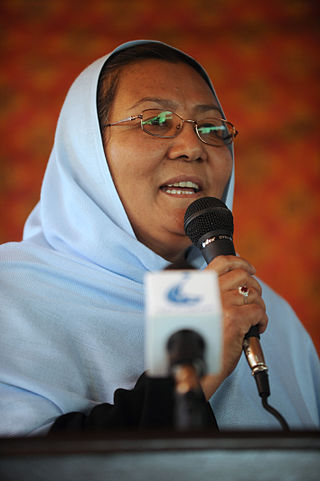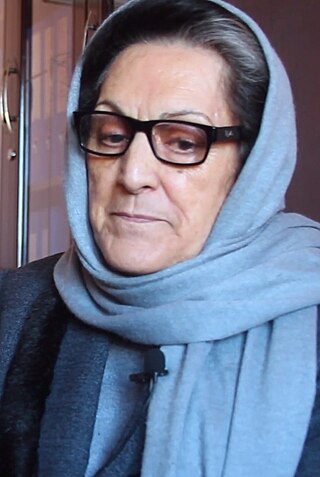Related Research Articles

The Revolutionary Association of the Women of Afghanistan (RAWA) is a women's organization originally based in Kabul, Afghanistan, that promotes women's rights and secular democracy. It was founded in 1977 by Meena Keshwar Kamal, an Afghan student activist who was assassinated in February 1987 for her political activities. The group, which supports non-violent strategies, had its initial office in Kabul, Afghanistan, but then moved to Pakistan in the early 1980s.

The treatment of women by the Taliban refers to actions and policies by two distinct Taliban regimes in Afghanistan which are either specific or highly commented upon, mostly due to discrimination, since they first took control in 1996. During their first rule of Afghanistan, the Taliban were notorious internationally for their misogyny and violence against women. In 1996, women were mandated to wear the burqa at all times in public. In a systematic segregation sometimes referred to as gender apartheid, women were not allowed to work, nor were they allowed to be educated after the age of eight. Women seeking an education were forced to attend underground schools, where they and their teachers risked execution if caught. They were not allowed to be treated by male doctors unless accompanied by a male chaperone, which led to illnesses remaining untreated. They faced public flogging and execution for violations of the Taliban's laws.

Dr. Massouda Jalal is the first woman in the history of Afghanistan who ran for the Office of the President of Afghanistan in 2002, 2004, and again in 2019. Dr. Jalal emerged as a leading voice of Afghan women after her election as the Representative to the 2002 Loya Jirga as she became one of the frontrunners for the position of Interim President of Afghanistan, opposite to ex-president Hamid Karzai.

Dr. Habiba Sarābi is a hematologist, politician, and reformer of the reconstruction of Afghanistan after the Taliban first took power. In 2005, she was appointed Governor of Bamyan Province - the first Afghan woman to become a provincial governor. She had served as Afghanistan's Minister of Women's Affairs and as Minister of Culture and Education. Sarabi was instrumental in promoting women's rights and representation and environmental issues. She belongs to the ethnic Hazara people of Afghanistan. Her last name is sometimes spelled Sarobi.

Malalai Joya is an activist, writer, and a politician from Afghanistan. She served as a Parliamentarian in the National Assembly of Afghanistan from 2005 until early 2007, after being dismissed for publicly denouncing the presence of warlords and war criminals in the Afghan Parliament. She was an outspoken critic of the Karzai administration and its western supporters, particularly the United States.

Sakena Yacoobi is an Afghan activist known for her work for promoting access to education for women and children. She is the founder and executive director of the women-led NGO Afghan Institute of Learning. For her work, Yacoobi has received international recognition, including the 2013 Opus Prize, the 2015 WISE Prize, the 2016 Harold W. McGraw Prize in Education, and an honorary degree from Princeton University.

Zakia Zaki was an Afghan journalist for the Afghan Radio Peace (Sada-i-Sulh) station north of Kabul, Afghanistan. She had been given threats on account of her work and was killed at her home outside of Kabul in April 2007. Zaki was the first Afghani journalist to speak out against the Taliban after the US forces initiated the War in Afghanistan (2001–present), while she also championed other causes like gender equality and women's rights in Afghanistan. Her murder was seen as part of a series of recent attacks against high-profile Afghan women.

Women's rights in Afghanistan are severely restricted by the Taliban. In 2023, the United Nations termed Afghanistan as the world's most repressive country for women. Since the US troops withdrawal from Afghanistan in 2021, the Taliban gradually imposed restrictions on women's freedom of movement, education, and employment. Women are banned from studying in secondary schools and universities, making Afghanistan the only country to prohibit females from studying beyond the sixth grade. Women are not allowed in parks, gyms, or beauty salons. They are forbidden from going outside for a walk or exercise, from speaking or showing any part of their face or body outside the home, or even from singing or reading from within their own homes if they could be heard by strangers outside. In extreme cases, women have reportedly been subjected to gang-rape and torture in Taliban prisons.
Robina Jalali, also known as Robina Muqimyar, is a former Olympic athlete who represented Afghanistan at the 2004 and 2008 Olympics and in 30 international events, competing in the 100-meter sprint. She competed athletically under the name Muqimyar and ran for a seat in the lower house of Afghanistan's parliament, the Wolesi Jirga, using her family name of Jalali.

Malala Yousafzai is a Pakistani female education activist, film and television producer, and the 2014 Nobel Peace Prize laureate at the age of 17. She is the youngest Nobel Prize laureate in history, the second Pakistani and the only Pashtun to receive a Nobel Prize. Yousafzai is a human rights advocate for the education of women and children in her native homeland, Swat, where the Pakistani Taliban had at times banned girls from attending school. Her advocacy has grown into an international movement, and according to former Prime Minister Shahid Khaqan Abbasi, she has become Pakistan's "most prominent citizen."

Fawzia Koofi is an Afghan politician, writer, and women's rights activist. Originally from Badakhshan province and ethnically Tajik, Koofi was recently a member of the Afghan delegation negotiating peace with the Taliban in Doha Qatar. She is an ex Member of Parliament in Kabul and was the Vice President of the National Assembly.

Shafiqa Habibi is a journalist, television anchor, activist, and politician from Afghanistan. She is known for her work to support women journalists, and for her 2004 candidacy for Vice President of Afghanistan as the running mate of Abdul Rashid Dostum.

Roya Rahmani is an Afghan diplomat who served as Afghanistan's first female ambassador to the United States and non-resident ambassador to Mexico, Argentina, Colombia, and the Dominican Republic from December 2018 to July 2021. She is currently the Chair of the international advisory company in development finance — Delphos International LTD. She is also a distinguished fellow at the Georgetown Institute for Women, Peace, and Security, a senior advisor at the Atlantic Council's South Asia Center, and a senior fellow for international security at the New America Foundation. From 2016 to 2018, she served as Afghanistan's first female ambassador to Indonesia, first ever ambassador to the Association of Southeast Asian Nations, and non-resident ambassador to Singapore.
Fatima Gailani is an Afghan political leader and women's rights activist, who previously served as president of the Afghan Red Crescent Society. She was recognized as one of the BBC's 100 women of 2021.
Crystal Bayat is an Afghan social activist and human rights advocate known for her protests against the Taliban takeover, advocacy for women rights and political activism inside and outside Afghanistan. A native of the Ghazni province, Shia (coming from the Bayat family, a Turkic ethnicity minority, Bayat was born in 1997 in Kabul. She grew up most of her life with democracy and positive societal changes. She is currently continuing the fight to preserve Afghan human right's achievements as an agent of change.
Shaharzad Akbar is an Afghan human rights activist who served as the chairperson of the Afghanistan Independent Human Rights Commission until the beginning of 2022.
Nasrin Husseini is an Afghan-born Canadian advocate of refugees, veterinary researcher, and a food activist, working to remake the food system. Her research focuses on advancing animal health through breeding and improving the productivity of the food derived from farm animals. In 2021, she was part of the 100 Women BBC list, which includes the most inspiring and influential women in the world.
Tamana Zaryab Paryani is an Afghan journalist and women's rights activist known for her protests against Taliban rule in Afghanistan. She is widely recognised as a symbol of the women's struggle in Afghanistan. In December 2022, Tamana was named as one of BBC's 100 Women. She is a member of an Afghan women's rights activist group Seekers of Justice. She fled Afghanistan in August 2022 and now lives in Germany.
Pashtana Durrani is an Afghan feminist, activist, and educator. She is the founder of LEARN Afghanistan, the country’s first digital school network, dedicated to providing education to Afghan children and women, particularly focusing on girls’ education and women’s rights.
References
- 1 2 3 4 5 "The young Afghan woman fighting for women's rights - The Migrant Project". www.themigrantproject.org. 14 September 2017. Retrieved 8 February 2022.
- 1 2 3 "BBC 100 Women 2021: Who is on the list this year?". BBC News. 7 December 2021. Retrieved 8 February 2022.
- 1 2 3 4 5 "Afghan Women Experts". Onward for Afghan Women. Retrieved 8 February 2022.
- ↑ "In Taliban Strongholds, a Woman Stands for Peace". Georgetown Institute of Women Peace and Security. Retrieved 8 February 2022.
- ↑ Humayoon, Haseeb, and Mustafa Basij-Rasikh. Afghan Women's Views on Violent Extremism and Aspirations to a Peacemaking Role. United States Institute of Peace, 2020.
- ↑ "Alumni 2018". N-PEACE. Retrieved 8 February 2022.